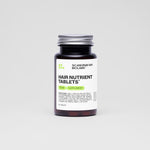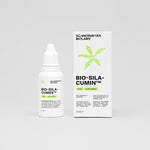As the chilly weather rolls in, your hair could use some extra care. The cold air, winds, and indoor heating can quickly dry it out, leaving it prone to breakage. It’s no surprise that hair shedding peaks during autumn and winter. [1,2]
Luckily, seasonal superfoods can give your hair the nutrients it needs to stay healthy. In this blog, we’ll dive into the top autumn and winter foods that will help your hair thrive, no matter what the weather throws at you!
Table of content
The Science Behind Hair Growth and Nutrition
Good nutrition is vital to hair health. [4] It can:
- Protect your hair from damage. [5] Some foods contain antioxidants, which can fight off free radicals. Without them, free radicals can build up and cause damage to your hair.
- Support hair growth. [5] When you don’t get enough of the right nutrients, your hair can get weaker and even fall out.
As your leading source for hair health information over the past 4 years, we never compromise on accuracy. When it comes to your health, you deserve information you can truly rely on - and earning your trust is our top priority.
Here's how Scandinavian Biolabs ensures every piece of content meets the highest standards of accuracy and integrity:
- Credentialed Experts: Our reviewers are actively practicing doctors and medical researchers
- Stringent Reviews: Content undergoes rigorous editing by subject specialists and review by a practicing doctor.
- Evidence-Based: We rely on well-established research from trusted scientific sources like peer-reviewed journals and health authorities.
- Full Transparency: Our editorial standards, writer credentials, reviewer credentials, correction process, and funding are all publicly documented.
- Independent Voice: While we do promote products, we operate in a vacuum to business operations. Our main goal is just an unwavering commitment to providing medically-sound guidance.
You can count on Scandinavian Biolabs to consistently deliver the trustworthy health information you deserve. Read our Editorial Standards.
The Key Vitamins and Nutrients for Hair Health
Understanding how food affects your hair can help you make better choices. Let's break down the key nutrients for hair health.
Protein
A protein called keratin makes up hair. Without enough protein, your hair can become weak and thin. [5,6]
On the flip side, protein can strengthen your hair and promote its growth. For example, in one study [7], women with thinning hair took a protein supplement. The group that took the supplement noted an increase in hairs in the target area. They also had less hair fall than the placebo group and felt more satisfied with their hair.
Vitamin C and Vitamin E

Vitamin C helps your body [8]:
- Make collagen. Collagen is a protein that helps keep your hair strong and healthy. Without enough collagen, your hair can become fragile and prone to breakage.
- Absorb iron, another crucial nutrient for hair growth and one of the most common nutrient deficiencies linked to hair loss.
Vitamin E is a powerful antioxidant. [9] It shields your hair from pollution and UV rays from the sun, helping to prevent damage and hair loss. In one study [9], 21 people with hair loss took tocotrienol supplements (a form of Vitamin E) and another group of 17 people took a placebo with no active ingredients. The group taking tocotrienol saw a 34.5% increase in the number of hairs. In contrast, the placebo group saw no significant change. Likewise, studies indicate that people with hair loss have lower antioxidant levels.
Vitamin C and E work better together. [8] Vitamin C helps fix and regenerate Vitamin E, ensuring that both are always ready to protect your hair.
A study [10] on women experiencing hair thinning confirmed this. Researchers found that women who took vitamin C and E supplements had more hair growth. Their hair was thicker, shinier, and their scalp looked healthier.
Vitamin D
Vitamin D helps regulate the hair growth cycle [6,11]. So, when your body doesn’t get enough vitamin D, it can lead to hair loss.
One study found that vitamin D levels were much lower in women experiencing hair loss. [12] Research also indicates that lower levels of vitamin D can lead to more severe hair loss.
Biotin (Vitamin B7)
Studies [11] show that biotin can increase protein synthesis in hair follicles helping to strengthen your hair.
In a review of 18 cases, people using biotin for hair growth noted healthier hair. However, biotin is most beneficial for those with a biotin deficiency.
Omega-3 Fatty Acids
Omega-3 fatty acids have anti-inflammatory properties. [5] Inflammation can disrupt the hair growth cycle, so reducing it can help you maintain healthy growth.
A study [13] divided 120 women into groups, one of which took a supplement with omega-3 fatty acids for six months. This group saw significant improvements in their hair density and thickness.
Iron
Iron helps [6]:
- Transport oxygen to your hair follicles. Hair follicle matrix cells are among the fastest-growing cells in your body. Without enough iron transporting oxygen to these cells, they can’t work as they should, leading to hair loss.
- Your body makes DNA. Hair follicles need DNA to grow new hair. This is why, in some studies [6], reversing iron deficiency restored hair growth.
Zinc
Zinc promotes hair growth by [6]:
- Encouraging hair cell division.
- Stimulating protein production.
On the other hand, low zinc levels can cause hair loss. A study [6,14] with 312 patients, who suffer from hair loss, proved this. It also showed that zinc supplements can boost hair growth in people with low zinc levels.
Autumn and Winter Superfoods for Hair Growth

As the weather cools, you can adjust your diet to include the right nutrients for healthier hair. Autumn and winter offer plenty of nutrient-rich fruits, vegetables, and nuts.
Autumn and Winter Fruits for Hair Growth
- Pomegranates: One medium pomegranate contains about 30 mg of Vitamin C.
- Cranberries: A cup of cranberries gives you 14 mg of Vitamin C. Cranberries are also full of antioxidants.
- Kiwi: One kiwi has about 71 mg of Vitamin C—enough to cover your daily needs. It also helps your body absorb iron.
- Pears: One medium pear contains about 7 mg of Vitamin C. Pears also have other antioxidants.
Autumn and Winter Vegetables for Hair Health
- Sweet Potatoes: One medium sweet potato gives you over 1,000 mcg of Vitamin A.
- Brussels Sprouts: One cup of cooked Brussels sprouts contains 96 mg of Vitamin C. They also provide small amounts of Vitamin A, Vitamin E, and iron.
- Beets: One cup of cooked beets has about 1.3 mg of iron.
- Carrots: One medium carrot contains about 509 mcg of Vitamin A.
Autumn and Winter Nuts for Hair Growth
- Walnuts: Walnuts are full of omega-3 fatty acids.
- Almonds: Just one ounce of almonds gives you about 7.3 mg of Vitamin E, nearly half of your daily need.
Nuts are also a great source of protein, an essential nutrient for the production of keratin, the protein that makes up hair.
Takeaway
Autumn and winter superfoods can give your hair a healthy boost. While it may not be as easy to maintain a healthy diet during the colder months, they bring plenty of nutrient-rich fruits, vegetables, and nuts. Each one plays a key role in keeping your hair strong and healthy.
By focusing on foods like nuts, and seasonal vegetables and fruits, you can prepare your hair for the colder weather.
Start your journey to healthier, more resilient hair today. Click here to learn more.
References
- Randall, V. A., & Ebling, F. J. (1991). Seasonal changes in human hair growth. The British journal of dermatology, 124(2), 146–151. https://doi.org/10.1111/j.1365-2133.1991.tb00423.x
- Kunz, M., Seifert, B., & Trüeb, R. M. (2009). Seasonality of hair shedding in healthy women complaining of hair loss. Dermatology (Basel, Switzerland), 219(2), 105–110. https://doi.org/10.1159/000216832
- Randall VA, Ebling FJ. Seasonal changes in human hair growth. Br J Dermatol. 1991;124(2):146-151.
- Goldberg LJ, Lenzy Y. Nutrition and hair. Clin Dermatol. 2010;28(4):412-419.
- Rajput RJ. Influence of Nutrition, Food Supplements and Lifestyle in Hair Disorders. Indian Dermatol Online J. 2022;13(6):721-724.
- Guo EL, Katta R. Diet and hair loss: effects of nutrient deficiency and supplement use. Dermatol Pract Concept. 2017;7(1):1-10.
- Ablon G. A 3-month, randomized, double-blind, placebo-controlled study evaluating the ability of an extra-strength marine protein supplement to promote hair growth and decrease shedding in women with self-perceived thinning hair. Dermatol Res Pract. 2015;2015:841570.
- Telang PS. Vitamin C in dermatology. Indian Dermatol Online J. 2013;4(2):143-146.
- Beoy LA, Woei WJ, Hay YK. Effects of tocotrienol supplementation on hair growth in human volunteers. Trop Life Sci Res. 2010;21(2):91-99.
- Glynis A. A Double-blind, Placebo-controlled Study Evaluating the Efficacy of an Oral Supplement in Women with Self-perceived Thinning Hair. J Clin Aesthet Dermatol. 2012;5(11):28.
- Patel DP, Swink SM, Castelo-Soccio L. A Review of the Use of Biotin for Hair Loss. Skin Appendage Disord. 2017;3(3):166-169.
- Rasheed H, Mahgoub D, Hegazy R, et al. Serum ferritin and vitamin d in female hair loss: do they play a role? Skin Pharmacol Physiol. 2013;26(2):101-107.
- Le Floc’h C, Cheniti A, Connétable S, Piccardi N, Vincenzi C, Tosti A. Effect of a nutritional supplement on hair loss in women. J Cosmet Dermatol. 2015;14(1):76-82.
- Park H, Kim CW, Kim SS, Park CW. The therapeutic effect and the changed serum zinc level after zinc supplementation in alopecia areata patients who had a low serum zinc level. Ann Dermatol. 2009;21(2):142-146.






